

Dr Joseph Vancell. XXIX_No4.pdf. Current# Assessment Definition. In education, the term assessment refers to the wide variety of methods that educators use to evaluate, measure, and document the academic readiness, learning progress, and skill acquisition of students from preschool through college and adulthood.
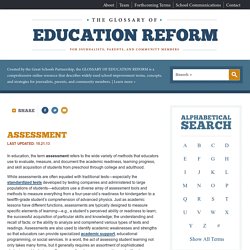
What Is Assessment? › Assessment › University of Connecticut. Definitions Various definitions of assessment and the role it plays in teaching and learning: Assessment involves the use of empirical data on student learning to refine programs and improve student learning.
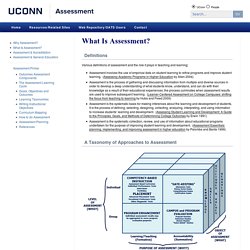
(Assessing Academic Programs in Higher Education by Allen 2004) Assessment is the process of gathering and discussing information from multiple and diverse sources in order to develop a deep understanding of what students know, understand, and can do with their knowledge as a result of their educational experiences; the process culminates when assessment results are used to improve subsequent learning. (Learner-Centered Assessment on College Campuses: shifting the focus from teaching to learning by Huba and Freed 2000) Assessment is the systematic basis for making inferences about the learning and development of students. It is the process of defining, selecting, designing, collecting, analyzing, interpreting, and using information to increase students’ learning and development. JOLT - Journal of Online Learning and Teaching. Lorna R.
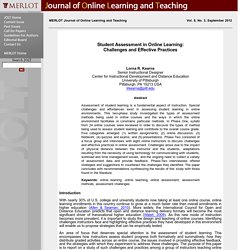
Kearns Senior Instructional Designer Center for Instructional Development and Distance Education University of Pittsburgh Pittsburgh, PA 15213 USA lrkearns@pitt.edu Introduction With nearly 30% of U.S. college and university students now taking at least one online course, online learning enrollments in this country continue to grow at a much faster rate than overall enrollments in higher education (Allen & Seaman, 2010). More widely, the International Council for Open and Distance Education predicts that open and distance learning delivery formats will become the most significant driver of transnational higher education (Walsh, 2009). As this new mode of instruction becomes more prevalent, it is important to study the design and teaching of online courses. Teaching, Learning and Assessment for Adults: Improving Foundation Skills. Executive summary | Table of contents | How to obtain this publication Executive summary Too many adults still fail to acquire even basic skills, with enormous effects on their individual lives and on their countries’ economic and social well-being.
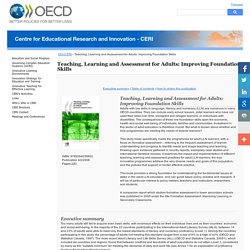
In the majority of the 23 countries participating in the International Adult Literacy Survey (IALS), between 14 and 23% of adults were able to meet only the lowest standards of literacy and numeracy proficiency (Level 1). Among the countries participating in this study, the percentage of adults not meeting this standard ranges from a low of 8% to a high of 43% (OECD and Statistics Canada, 1997). The consequences of low foundation skills span the economic, health and social well-being of individuals, families and communities. Complete executive summary. Problem loading page. Training Toolkit - Needs Assessment - Assessing Training Needs.
The first step in building a training course is identifying the needs of our target participants.
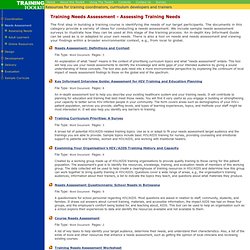
The documents in this category provide a variety of ideas for conducting a needs assessment. We include sample needs assessment surveys to illustrate how they can be used at this stage of the training process. An in-depth Key Informant Guide can be used as is or adapted to your own needs. There is also a tool on needs and needs assessment and viewing your findings within a broader environmental context, e.g., from local to global. Forms of Assessment. Teacher Education and Child Care Institute - Pathways to Teaching Adult Learners. UCD Adult Education Centre - Assessing Adults. Accreditation Explained Why We Assess Anxieties of Adult Learners How We Assess Setting Assessments Presenting Assignments Marking Guidelines Recording Results Feedback.
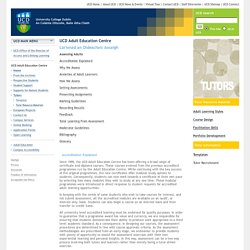
Assessing skills of adult learners in 2011. Key Findings Use of the Assessment Tool in 2011 The picture of use of the Assessment Tool in 2011 is highly dynamic, with education providers and other organisation beginning to use the Tool either during the pilot year of 2010, or some time during 2011.
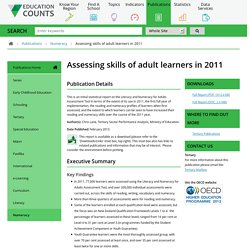
The Assessment Tool was still undergoing development, with a short ‘Snapshot’ version of the Tool becoming available in February 2011 for reading and numeracy. How do we assess adult learners without necessarily testing them? In the last section of Wlodkowski’s Motivational Framework for Culturally Responsive Teaching from his book Enhancing Adult Motivation to Learn, he focuses on engendering competence among adult learners.
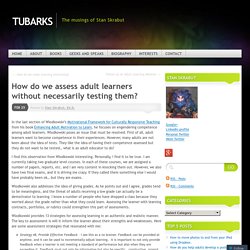
Wlodkowski poses an issue that must be resolved. First of all, adult learners want to become competence in their experiences. However, many adults are not keen about the idea of tests. They like the idea of having their competence assessed but they do not want to be tested… what is an adult educator to do? Instructional Design Models and Methods.
Instructional Design Models and Methods "Models, like myths and metaphors, help us to make sense of our world.
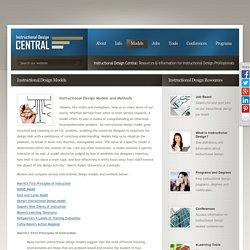
Whether derived from whim or from serious research, a model offers its user a means of comprehending an otherwise incomprehensible problem. An instructional design model gives structure and meaning to an I.D. problem, enabling the would-be designer to negotiate her design task with a semblance of conscious understanding. Models help us to visualize the problem, to break it down into discrete, manageable units. The value of a specific model is determined within the context of use. Analyzing and Evaluating the Phases of ADDIE. Analyzing and Evaluating the Phases of ADDIE T.
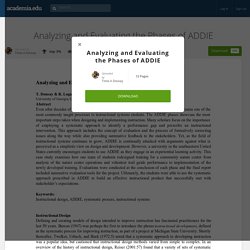
Dousay & R. Logan University of Georgia, USA. teedee@uga.edu. The ADDIE Model: Instructional Design. Share on StumbleUpon0 shares on StumbleUpon Courses & Certification Instructional Design Certificate (Fully Online). This fully online program is for anyone developing and/or teaching an online course. Learn more... ADDIE Model. The ADDIE model is the generic process traditionally used by instructional designers and training developers. The five phases—Analysis, Design, Development, Implementation, and Evaluation—represent a dynamic, flexible guideline for building effective training and performance support tools. While perhaps the most common design model, there are a number of weaknesses to the ADDIE model which have led to a number of spin-offs or variations. It is an Instructional Systems Design (ISD) model. Problem loading page. MIT Teaching and Learning Laboratory. ASSESSMENT is the systematic collection of data to monitor the success of a program or course in achieving intended learning outcomes (ILOs)* for students.
Assessment is used to determine: What students have learned (outcome) The way they learned the material (process) Their approach to learning before, during, or after the program or course You can assess students before instruction to get a baseline of what students know (for example, by administering a pretest). During instruction, assessment can be used to determine what students are learning so you can adjust your teaching, if needed. Quizzes or mud cards, which ask students to identify the “muddiest point” that remains for them after the class, are two methods of this kind of “formative assessment.” EVALUATION is a judgment by the instructor or educational researcher about whether the program or instruction has met its Intended Learning Outcomes (ILO).
Evaluation vs. Assessment. Assessment vs. Evaluation The term assessment and evaluation are quite different. For example, an evaluation is more focused on making a judgment or determination concerning the quality of a performance, work product or use of skills against a set of standards. Evaluations are designed for and intended to document the level of achievement that has been attained. An assessment, on the other hand, is more focused on measuring a performance, work product, or skill in order to offer feedback to document strengths and growth and to provide directives for improving future performance.
CSS assessments are not like most traditional evaluations. Center for Instructional Excellence - Purdue University. Back to Teaching Topics Finding out how well students have learned is an important part of teaching. While the respective information can be important for assigning grades, the same and other information about student learning can be gathered and used for other important purposes. To do so, it is important to understand the difference between assessment and evaluation. Assessment vs. Evaluation: Tips & Advice for Teachers. Examples of Formative Assessment. When incorporated into classroom practice, the formative assessment process provides information needed to adjust teaching and learning while they are still happening.
The process serves as practice for the student and a check for understanding during the learning process. The formative assessment process guides teachers in making decisions about future instruction. Here are a few examples that may be used in the classroom during the formative assessment process to collect evidence of student learning. Observations. Types of Formative Assessment. Assessment For Learning-CFT Initiatives and Progress. Assessment for Learning: Home. Assessment for learning - Dylan Wiliam - Video search. Assessment for, as and of Learning. Six Fundamental Questions for Conversations on Student Learning - SLO - Office of Assessment. Overview of Student Learning Assessment - SLO - Office of Assessment. Adult Basic Education (ABE)
Assessment Assessment should be authentic and reflect broadly-based, transferable skills and conceptual understandings. Assessment needs to be continuous, authentic, valid, and incorporate multiple assessment tools. The assessor can be the instructor, the learner, or the learner’s peers. Home - Educational Assessment Tools & Theories - LibGuides at Eastern University. English K–10. Standards The Board of Studies K–10 Curriculum Framework is a standards-referenced framework that describes, through syllabuses and other documents, the expected learning outcomes for students.
Standards in the framework consist of three interrelated elements: The difference between assessment and evaluation.pdf. Design and Assessment of Adult Learning. Section G. Kyle Family Learning & Career Center The method we use to assess students at our center is evolving - that's a good sign. Design for Adult Learning, Teaching and Learning Theory, Feedback. Extended Education - Continuing Education - Certificate in Adult and Continuing Education (CACE)
University of the People - where students get free degrees. 7 May 2014Last updated at 19:32 ET By Jane Wakefield Technology reporter Mr Eid never thought he would get a degree, let alone a free one. Ali Patrik Eid is a happy man right now. A few weeks ago he graduated from a university that he didn't pay a penny for. Learning Models. 2. Working with Adult Learners. Course Overview Working with Adult Learners introduces you to the kinds of learners that come into LBS programs, the diverse issues that they bring along with them, and the impact these issues have on the learners’ success. Characteristics of Adult Learners. CSTP_self_assessment.pdf. Teaching Adult Learners Certificate - UC San Diego Extension. The Teaching Adult Learners Professional Certificate is an online certificate program. Teaching Adult Learners (WPTrain) Adult Learning Theory and Principles. Teaching Adult Learners. 5 Principles for the Teacher of Adults.
Teaching Qualification in Adult Education - University of Stirling – Teaching Qualification in Adult Education – University of Stirling. Courses. Study-Unit Description - Faculty of Education. Adult Learning and Teaching (ALT) Courses. Portland State Graduate School of Education: Educational Leadership & Policy. Master of Education in Adult Learning. Commission on Adult Basic Education. Teaching and Learning Resources / Andragogy.